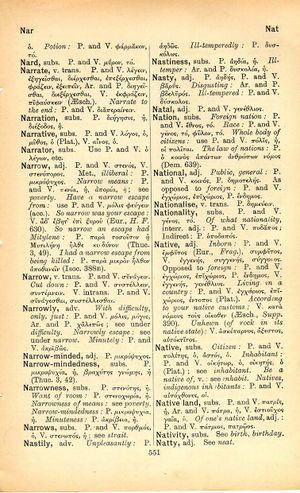narrative: Difference between revisions
From LSJ
νεκρὸν ἐάν ποτ' ἴδηις καὶ μνήματα κωφὰ παράγηις κοινὸν ἔσοπτρον ὁρᾶις· ὁ θανὼν οὕτως προσεδόκα → whenever you see a body dead, or pass by silent tombs, you look into the mirror of all men's destiny: the dead man expected nothing else | if you ever see a corpse or walk by quiet graves, that's when you look into the mirror we all share: the dead expected this
(6_10) |
(D_6) |
||
| Line 5: | Line 5: | ||
{{Lewis | {{Lewis | ||
|lshtext=<b>narrātīvē</b>: adv. [[narro]],<br /><b>I</b> in the [[way]] of [[narration]], [[Don]]. ad Ter. argum. And. | |lshtext=<b>narrātīvē</b>: adv. [[narro]],<br /><b>I</b> in the [[way]] of [[narration]], [[Don]]. ad Ter. argum. And. | ||
}} | |||
{{Gaffiot | |||
|gf=<b>narrātīvē</b> ([[narrativus]]), en racontant, au moyen d’un récit : Don. Andr. Arg. | |||
}} | }} | ||

